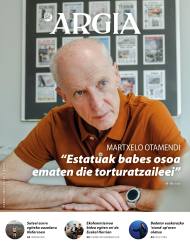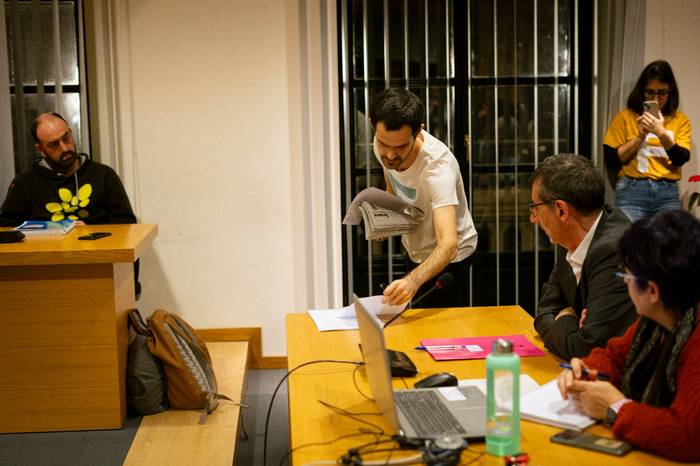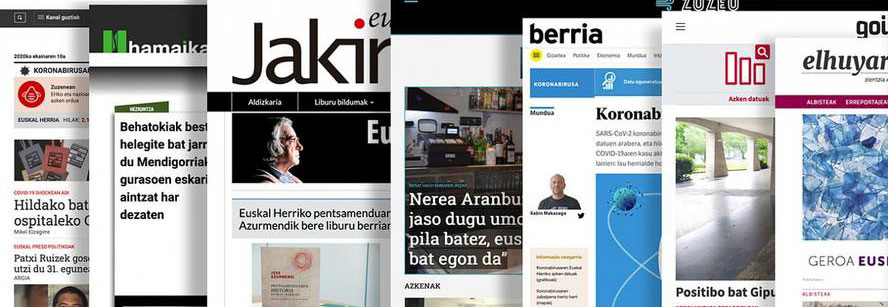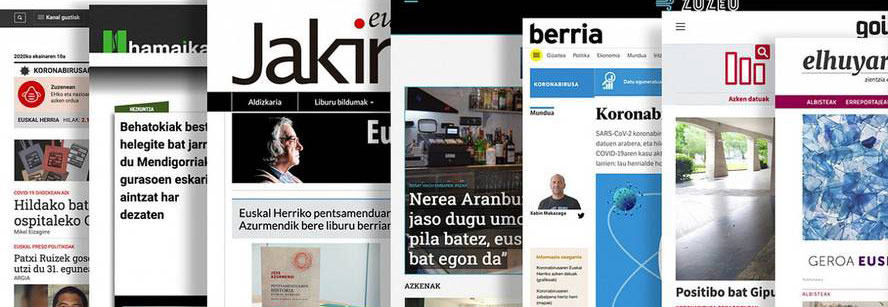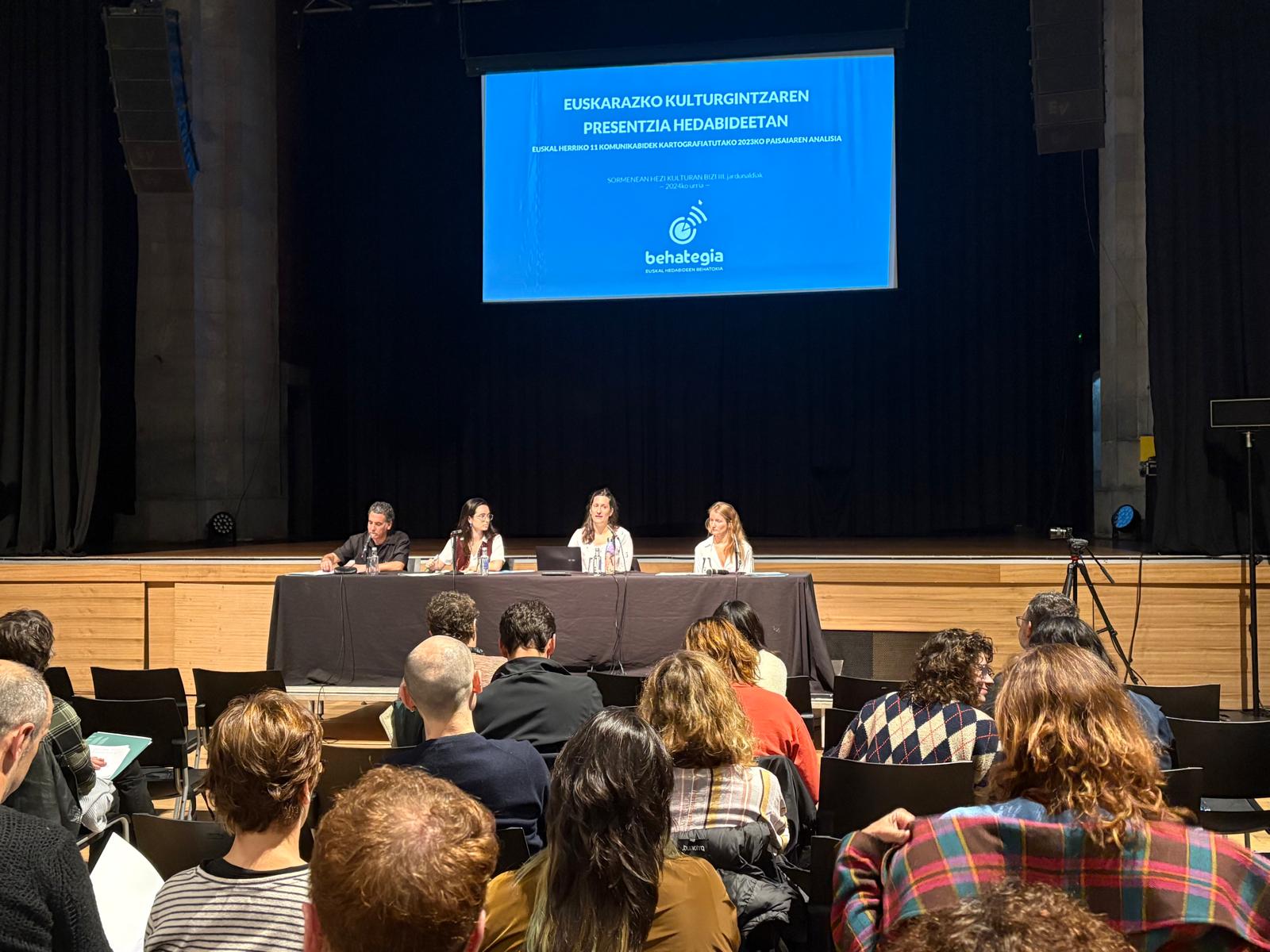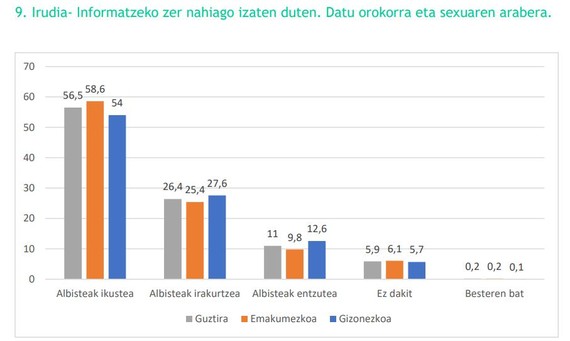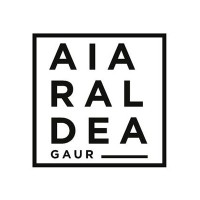"The new director brings 'Berria' to a level of quality he has not had so far"
- It has given most of its life linked to the newspaper in Euskera, which is its origin mark and its designation of origin. It has always been linked to the daily press and has brought little dislikes. The largest, the closure of Euskaldunon Egunkaria in 2003 and the first loss of people per hour.

Martxelo Otamendi Egiguren. Tolosa, 1957
Director of Euskaldunon Egunkaria, until he was closed by order of the Government of Spain, and to be from Berria until his retirement. And in the middle, and forever, torture. He said: that newspaper in Basque, closed in 2003; first ten detainees, seven tortured, three developed for cancer. And the day after closing Egunkaria, every day and every month, New. And after 30 years, the relay: Amagoia Mujika Tolaretxipi. And from now on, the retirement work projects.
Born in Tolosa in 1957.
Three boys and a girl, and I'm the third one in boys. Meanwhile, a child was born that I did not know, that survived little. My father was from the Harvest of Navarra [Araiz], my mother of Tolosa, but her father was from Azpeitia – Egiguren, from the bar Eperra, from Campion – and her mother from Alkiza. But don't ask a lot as a child, because they have poor memory in a lot of things. I don't know what I was doing when I was five, nor do I know if I lived. In many other things, I have good memory, but some things, some milestones, I repeat them many times. In the end, I don't know if memory is in spite, or is, simply, if we build a story in our mind through the repeated account of some things.
1968. “In the midst of Bentaundi, his brother Xabier [Etxebarrieta] was murdered.”
Not even me. I was 11 years old and I have no memory. On the contrary, I remember the Burgos Process [December 1970], on the occasion of a strike in the school, and in the Triangle of Tolosa, where we lived, where all the salsa, demonstrations, protests and everything else came together. I saw him at home, for the repression of the civil guards. Then I remember when Carrero Blanco was killed, [1973] I got to school and told a friar: “This and this has happened this morning in Madrid.” And I don't know what that school textually answered, or “It was time!”, “I don’t care anything!”… but I know that White Carrero’s death did not hurt him.
1974-75. The University Orientation Course has been completed.
And then I was in Euskalduntze 3, with Antton Izagirre as a professor. I was eager to recover the lost time, and soon I started doing a level D course, between week in the night school of Tolosa, and on Saturdays in the EUTG of Donostia… In my house, if my father would catch my brothers talking in Spanish, he would not pay us and then they would go to the mother. Our house was a typology that has lasted many years in the Navarre mountain: “At home in Basque, and only in Basque, because it is our language!” The Basque was for the home and not for Lizardi. Our father's attitude was not ideological or political, but prepolitical.
1977. Basque Professor.
I have said what our father’s attitude was, “At home, in Basque!” and that alone. And the subscription of Zeruko Argia and Anaitasuna, or the tuition of the Larraona course in Pamplona in the UEU, was paid to me by my mother, because my father seemed political. At that time, many people believed it to be very widespread: at home they were very strong when it came to the Basque country, but outside the house there was another. I was the first to take these magazines at home: my older brother was very young friar, my second brother did not have that desire and my sister who followed me took the Euskera title very young, at 13!
.jpg)
1984. Euskera professor in the Basque Country of Tolosa and collaborating in the Basque supplement of the Egin newspaper. The
head of the supplement, Xalbador Garmendia, I think came to the Euskaltegi and I started writing with Xabier Telleria in the Egun on supplement for his alias. By then, in El Diario Vasco he also wrote the chronicles of the Tolosa basketball team, taking advantage that he was a player of the team. At the same time, in summer, I was going to London to see theater. There was an actor who really appreciated, Vanessa Redgrave. And I also saw Jack Lemmon and Faye Dunaway acting. In London, the theater season started in September, but in August, companies were rehearsing to the public, and they were paying and entering the cheapest entrance to see the essays, in the cooker, who didn't hear half and didn't understand the other half.
“For them!” [Eraso!] They do it when they come here or when they go to Catalonia. They have the North Front and they know they have the support to do what they want."
1987. It started at ETB, with a program I like.
Andoni Aranburu called me from the television to run the show. If I am not mistaken, before I was offered to Kike Amonarriz, Kike told them no but gave them my name. So, today I am in Berria's director's office because Kike said no. Otherwise, I would continue to explain the subjunctive in the Basque Country. But at that age, I had the body, the desire to do different things, and television was an opportunity. Television had been working for five years, I had a mature point, but it was also time to experiment, and there I walked in, I have Txoria. This program lasted two more years and then I started in the follow-up group, as the responsible.
Summer 1989. Boise, Idaho, USA. We offer you at the PBS, on local public television. The
ETB's external shopping team had relationships with the PBS and I said and went to Jesús Igueres from the group. I didn't know it was Boise! Not the pastor! Not even with Pete Cenarrusa or Justo Sarria! Until then, although he had been at ETB, he didn't know how a program was being done. And I did it in Boise, a program, Outdoor Idaho, that we recorded in the wild, and I saw it, and I learned what it was to do the report and the interviews. I learned that in Boise! And I discovered the diaspora, the Basques of the second and third generation, those born there, but who knew Euskera and enjoyed a great fondness for Euskal Herria, the group of dances Oinkari, the Euskal etxea, the Bieter family… A new world!
1993. It was Joan Mari Torrealdai and Iñaki Uria, who offered him as director of Euskaldunon Egunkaria.
I took a black friend to a restaurant next to Lasarte's racecourse. I don't remember, and I don't remember, but when we closed and stopped the newspaper, the police asked me who that black friend was. But I didn't remember it! And the police, yes, Torrealdai told them, and then I discovered that Joan Mari was also in detention. Since then, speaking to Joan Mari and Iñaki Uria, they told me that I took a black friend to that meal. A friend of the time, who lived in London, who came from time to time. I mean, get out of there what I expected from that meeting.
You interrogate the police and find out that Joan Mari Torrealdai has been arrested. The civil guard and the police have also joined our conversation and their mistreatment.
That's their role, they're repressors, "A for them!" They do it when they come here or when they go to Catalonia. They have the North Front and they know they have the support to do what they want. The questionnaire shows that they do not have the least concern that nothing will happen to them. When they stopped me, I realized it and I showed it later. After the newspaper was closed, I was known by the civil guards. We go to Hondarribia airport and the civil guards are cowardice, as he said, “Look who comes there!” And the workers of Egunkaria have not escaped their treatment either.
"The government was willing to put a lot of money into the new news project, with conditions. Among those conditions was, for example, that I wasn't part of the new project, but our people said no."
2003. I don’t know if the technique of war is to close Euskaldunon Egunkaria,
plunder ARGIA… Joan Mari Torrealdai said that Egunkaria closed to criminalize Basque cultural activity. Joan Mari said that the Civil Guard had a thesis, according to which the institutional Basque – government, government of Navarra, deputies, municipalities… – is accepted to support the Basque – among other things because the legislation so gathers it – and the Basque civil, social, is the responsibility of ETA. Euskalgintza institutional, free; Euskalgintza social, dependent on ETA. I think there is more than that, although Torrealdai was more than me in explaining the state strategy.
.jpg)
Closure of Euskaldunon Egunkaria.
But also according to the logic of the State, the Journal was not at the forefront of the institutions that could oppose the State. The same was on list number 20! I think they wanted to tell people: “Look, the Ibarretxe Plan! Care, right of self-determination! Beware, independence!.. Don’t you believe?”, and Egunkaria closed, one of the pupils of Basque culture, the leaders of Egunkaria and the people who are part of the society of Euskal Herria – Joan Mari Torrealdai, Txema Auzmendi, Iñaki Uria, Xabier Oleaga, Pello Zubiria…
"González Txabarri says that someone called him – but we still don't know who called him, Txabarri hasn't said so – that the civil guards who came to Arantzazu were arrested in Miranda"
And torturado.La
torture has three functions: getting information, revenge and scare citizens. They left me free to speak to me, I was a propagator of that fear. The message may or may not come back. Torrealdai torture shows that the Spanish state was willing and willing to do everything. For example, for Arantzazu. Gonzalez Txabarri says someone called him – but we still don’t know who called him, Txabarri hasn’t said so – that the civil guards who came to Arantzazu were arrested in Miranda. A symbol, Arantzazu, although I do not know if they knew what Arantzazu means for Basque culture.
The state always ...
But, at least, the State [of Spain] did not dare to attack some of those who appeared on its macabre list, especially after the response that had the closure of Egunkaria, because in the San Sebastian demonstration and in the other demonstrations people did not only go to defend freedom of expression, the Basque Country and our rights. He also went to defend his party, his union, his own educational model... “Either stop this state strategy, or they will come against all our things!” It was already being said that the leaders of the Ertzaintza were going to place Spanish military leaders, as provided for by law.
Then the new newspaper, the current Berria, was born.
And the government made an attempt to “redirect” the project, through several interviews, and conditions that Egunkaria workers did not accept, although the government was willing to put a lot of money into the new project. Among those conditions was, for example, that I was not part of the new project, but our people said no. When you talk so much about reading the past, you have to do a complete reading, and for example, that's why I don't want to write a memory.
2008. They went to the European Court of Human Rights with the complaint of torture cases and were acquitted in 2010. In what is known as “justice and reparation”, is absolution reparation?
No, there has been no repair. The judgment of the [Court of Human Rights] in Europe is very harsh, very favorable, very contrary to the instruction of Judge Juan del Olmo, and that is what we needed: the acquittal on the one hand and a very harsh sentence on the part of Europe. Our people believed us, but we needed more people to believe and the acquittal helped us a lot. We also needed Europe to support our allegations of torture. I was the only one, bringing the allegations of torture to Europe, with the great work of lawyer Iñigo Iruin. And we got Europe to punish Spain, we also won that battle. Europe did not say that Martxelo Otamendi had been tortured, that the instruction had not been done correctly.
Spain received a fine of 24,000 euros, “very cheap”, he said.
“We pay for it. You, keep torturing!” If the intelligence of the state has decided to continue to torture, EUR 24,000 is not money, it is pure alms. According to the State, the information it can obtain through torture is worth much more. It is a strategy of the State, the State gives all the support to the torturers, and that is why we cannot know who those torturers are… However, I am convinced that I met a torturator. Among them was one with a loud voice or throat. I think this is what [Bernardo] Atxaga uses in the story Camilo Lizardi…. That was the voice of my torturer, who drank a lot of whisky from Scotland.
(...)
"They call me Torque!" said the torturer. “Torque… Torquemada. Do you know what Torquemada was?” and I: “Yes, the founder of the Civil Guard!” People laugh me because Torquemada was inquisitive and the founder of the Civil Guard was the Duke of Smoada [Francisco Girón Ezpeleta, Pamplona]. But that scratched voice stuck with me. Then I was in the torture suit of Portu and Sarasola, in the Provincial Court of San Sebastian, and ten or twelve civil guards were taken to the round of recognition, although dressed feebly in wigs, black glasses, etc. Almost like a mockery. At the time of declaring I began to speak one of them and I knew the striped voice of that Torquemada. “This is!” The civil guards are always interrogatory, they are two or three specialized groups, which work with the Basque Country.
"The journalists of Euskal Herria are people who have suffered a lot in us and others, directly or indirectly. And even though man has become accustomed, the situation was a burden: attacks, complaints, protests, demands, documents… It is very difficult"
2011. For many years he wanted to give that great news and they were able to give: ETA decided to end its armed activity. For many years, however, the media and journalists of the time had to work under this burden. The
human being is “accustomed” or adapted to all situations. But it is true that our journalists had a very bad time coming to the newsroom from a place where the attack was committed, or from a press conference to denounce the torture, or … The journalists of the department of Euskal Herria are people who have suffered a lot in us and others, directly or indirectly. And although the man has become accustomed, the situation was a burden: attacks, complaints, protests, demands, documents… It is very difficult. And on the other hand, I personally knew some of the deaths by ETA: Juan Mari Jauregi, Joxe Mari Korta… and also some tortured. Therefore, managing all this is complicated, you have to be respectful. Less bad than our body also activates its own self-protection mechanisms.
Some get better than others to defend themselves. Juan Mari Torrealdai suffered cancer and died. The cancer died of Inma Gomila. You had cancer.
And [Jabier] Salutregi, a cancer patient, has still died for many years in prison. And also Gorka Agirre, the historical member of the PNV, cancer; being the instructor of Grande Marlaska, put Agirre in the lawsuit in Faisán, and I have heard the nationalist leaders that his cancer originated in Faisán… We have the newspaper in the first blow of the lawsuit ten detainees, seven tortured, three we develop cancer and the two cancers are dead. And it is known that the origin of cancer is often due to post-traumatic stress. Torrealdai, [Imanol] based on the work of psychiatrist Kerejeta, Head of the Psychiatric Service of Donostia Hospital, or it has been, and Kerejeta, to myself, I know that there is a new discipline that links psychiatry and oncology. Question of probability.
.jpg)
2023. Agur, from Berria, Martxelo Otamendi.
I already had time to support, 30 years in the Basque newspaper! Always punished here! Kar, kar… The
event of Berria’s 20th anniversary, to introduce the new director, took the opportunity to thank everyone… I
forgot the readers! Thanks from here to readers, to friends Berria, to subscribers, to advertisers, and to institutions, political parties, unions, body builders… I forgot to thank you! & '97; Forgive me, said in elegant Basque.
"Men tell them it's easier to take care of responsibility positions, and I didn't realize that I had to put in place some mechanism for women to say yes, too. Until some colleagues made me see."
Forgive the women journalists who have not been appointed as department officials.
Yes. There have always been women in the management team, but never in a balanced way. I had a tendency to name the boys responsible. There are two observations here: on the one hand, I had this tendency and on the other, I did not make any movement to correct the situation. Men tell them it's easier than they do to take responsibility positions, and I didn't realize that I had to put in place some mechanism for women to say yes, too. Some colleagues made me see. And I also had to start the learning process. Fortunately, some of these women are today pioneers in feminism here.
Amagoia Mujika Tolaretxipi is the new director of Berria. What heritage has it received?
A strong, stable company, without big ups and downs… a newspaper that allows us to play in our league. We know what we can do and what we can't. Amagoia [Mujika Tolaretxipi] has been, along with many others, one of those that Berria has brought here, a quality product, even if it is ugly to say, comparable among the newspapers in the area, which is uncomplicated around the world, and Amagoia will make the Berria newspaper even better, without a doubt, has that capacity, and surely leads it to a level of quality that it has not had so far.
* * * * * * *
“Today there are
many things that are tolerated and, in many places, we have moved from disillusionment to normalcy, but in many parts of the world homosexuality is still a reason to expel your child from home or to leave home. I know cases. There is still a latent homophobia among us, and despite all the explanations given to the new generations that are not, they are also showing worrying homophobic attitudes."
“These are
life cycles. [Imanol, Lorea, Juan Luis, Idurre, Amagoia, Alberto, Jose Mari…] Young people entered the Egunkaria, some came from ARGIA, from the generation that created the newspaper, and then, at the end of this cycle, they took another path. The work in the newspaper has achaques, many hours, there are no high salaries, the work on Saturday… It happens in many newspapers, and it is the work of the director to have the relief prepared. You mentioned the brains, the early ones, and in your time the current fellow director. There's the relay. The quarry is the key.”
LAST WORD
Prisoners and independence
“A Catalan politician asked me that, what I have to do now, and I told him ‘Prisoners and Independence’. And I could add ‘Basque’. I won't stand still."
Gaur abiatu da Bizi Baratzea Orrian kide egiteko kanpaina. Urtaro bakoitzean kaleratuko den aldizkari berezi honek Lurrari buruzko jakintza praktikoa eta gaurkotasuneko gaiak jorratuko ditu, formato oso berezian: poster handi bat izango du ardatz eta tolestu ahala beste... [+]
Over the past few weeks I have had these two books in my hands: The space of reflection in Basque (Euskaltzaindia, 2024) and Mariano Ferrer, reflexive journalism. Journalism and commitment (Erein, 2023) . I have read that 42.2% of Basques see ETB1 and 20.6% read the Basque... [+]
Over the past few weeks I have had these two books in my hands: The space of reflection in Basque (Euskaltzaindia, 2024) and Mariano Ferrer, reflexive journalism. Journalism and commitment (Erein, 2023) . I have read that 42.2% of Basques see ETB1 and 20.6% read the Basque... [+]









